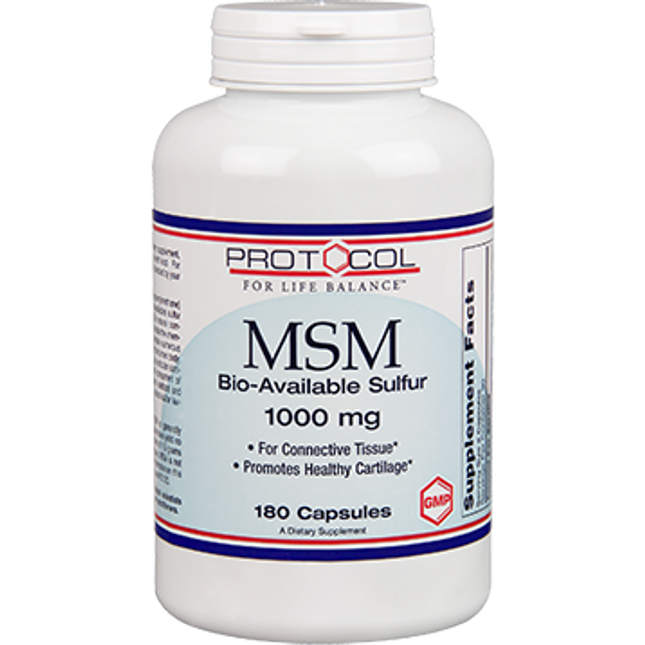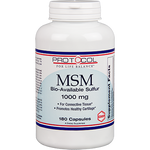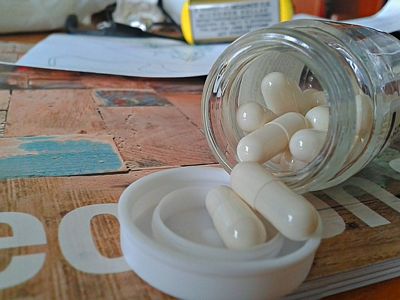MSM


MSM (Methylsulfonylmethane) is a natural form of bioavailable sulfur found in all living organisms. Sulfur is critical for the formation of collagen, keratin, and elastin, which are proteins that make up most of the body’s structural tissues, including hair, skin, nails, bone, cartilage, and ligaments. Sulfur is also necessary for glutathione, lipoic acid, and SAMe production. Clinical studies demonstrate that MSM may help to maintain healthy joint tissues.• For Connective Tissue• Supports Healthy JointsDietary ConsiderationsWheat FreeDairy/ Milk FreeGluten FreeSoy FreeYeast FreeSugar FreeStarch FreePreservative FreeSalt FreeCorn FreeServing Size: 2 CapsuleServings Per Container: 90Amount Per ServingMSM (Methylsulphonylmethane) (2,000 mg) 2 gOther Ingredients:Gelatin (capsule), Stearic Acid, Magnesium StearateSUGGESTED USAGE: As a dietary supplement, take two capsules 1-2 times daily with meals. For intensive use, increase dosage as directed by a health care practitioner.Store in a cool, dry placeContains no sugar, salt, starch, yeast, wheat, gluten, corn, soy, milk, egg or preservatives.All purchases subject to MAP policy compliance
$24.99
MSM Products
Methylsulfonylmethane (MSM) is a sulfur containing compound and is often used to help with osteoarthritis and to maintain good joint health. Use of MSM in combination with glucosamine and/or chondroitin can greatly reduce pain in the joints and support the development of healthy cartilage. Other supplements that enhance the effects of MSM supplements are collagen, krill oil or fish oil.
Even if you are not currently experiencing joint pain, adding MSM supplements to your daily intake may be wise. The wear and tear of daily life and of exercise can cause joint damage, but MSM supplements can help prevent this. In addition to supplements, be sure to eat plenty of fresh fruits and vegetables because methylsulfonylmethane is also absorbed from the soil by the roots of plants. For this reason, milk from dairy animals that are allowed free range on fresh grass is a good source of MSM.
Studies have shown that side effects of MSM supplements are few and mild. Some users of MSM have reported experiencing slight stomach upset or rashes on the skin; however, these side effects are minor when weighed against the level of pain support the supplement provides. Additionally, side effects can be mitigated by splitting dosage up into smaller doses throughout the day and by being sure to take MSM with food. Additionally, studies have shown that large amounts of MSM are not necessarily required for positive results, so you may be able to reduce your overall dosage significantly to address these side effects. Discuss use and dosage of MSM with your doctor to determine exactly how much you should take.
Also remember to look for MSM under its other names: DMSO2, sulfonylbismethane, methanesulfonylmethane, and methyl sulfone. No matter which name the product you decide on bears, you can be sure of finding the best quality and value right here at Vita Living.
Blog posts
-

in Fitness Tips To Control Sugar Cravings
Craving sugar is quite common, especially in women. Learning which foods can help you overcome it is the first step towards relieving cravings.
-

in Fitness What Are Dietary Supplements?
What are supplements and how can they help? What are the various kinds of supplements?
-

in Fitness Exercise For Healthy Heart
Participating in aerobic exercise is essential for good health and well being. Learn how it can help to greatly increase your hearth health and help...
-

in Nutrition Are Probiotics Actually Good For You?
Probiotics are living organisms that promote improved health by increasing the number of beneficial bacteria in the gastrointestinal tract.






